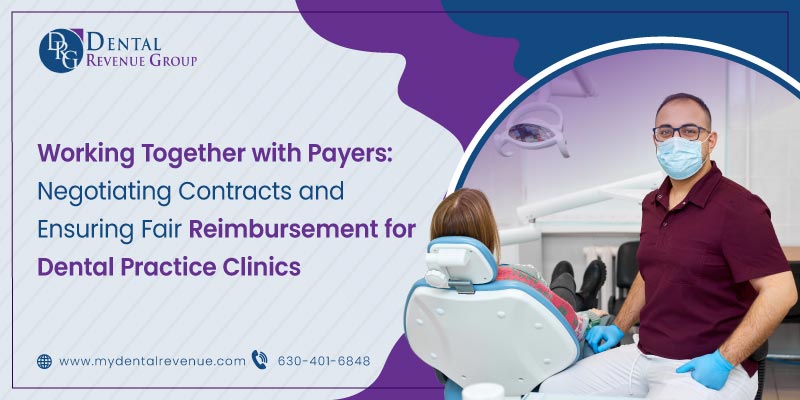Negotiating contracts with payers is a common practice for dental practices. Dental clinics may negotiate with multiple payers at the same time, as well as with individual payers throughout the year. Negotiating fair reimbursement for dental practice clinics requires objectivity during negotiations. It requires care to protect patients’ interests while maintaining commercial integrity between providers and payers involved in these negotiations. Negotiating contracts and advocating for fair reimbursement rates can make a significant difference to the financial success of your practice. In this blog post, we will discuss the importance of reimbursement for dental practice clinics and provide tips on how to work together with payers effectively.
What is a Contract?
A contract can be defined as an agreement between two or more individuals that establish mutual obligations, rights, and duties based on the exchange of promises or commitments. In other words, it’s an agreement that outlines what you’ll do for someone else in return for something (money, services, etc). It also defines how you’ll handle any problems arising from this relationship: what happens if we can’t fulfill our agreement? What happens if one person fails to honor their side?
Although the primary goal of a contract is to protect each party’s interests, courts have also recognized that contracts serve a secondary purpose of promoting commerce. The doctrine of mutuality is a one-way court interpretation of this principle. Mutuality allows parties to enter into agreements with certain expectations and prohibitions against specific actions because they benefit from their mutual relationship rather than as individuals or competitors in an open market system. This allows for more efficient use of resources by enabling organizations to specialize tasks without having every member work on everything else at once; it also reduces waste associated with duplicated efforts and promotes innovation by allowing teams together under one roof—but not necessarily within one office!
For Example
The concept behind mutuality extends beyond just dental practice clinics: almost any business could benefit from implementing some form of “contractual mutuality.”
When negotiating contracts with payers, it is important to maintain objectivity throughout negotiations. As dental practices negotiate with payers on behalf of their patients, they must use negotiation skills to achieve fair reimbursement for dental practice clinics. Negotiations are not personal and should never be treated as such; instead, they should be viewed as a business transaction that involves both parties’ best interests (the patients’ and the dental team’s). The goal of any negotiation is to find common ground between two conflicting positions until both sides are satisfied with where things stand at the end of each session or meeting. You must maintain a friendly tone while negotiating to build rapport with your opponent or opponent’s representative(s). This will make it easier for them to share information about what makes sense for them financially—and not just what works best for us!
What Should Include In Negotiated Contract?
A negotiated contract should be negotiated between providers and payers separately rather than as part of the provider-payer relationship. Deciding what services are covered and how those services will be paid should be determined by the parties involved in the negotiation and includes understanding all the existing relationships between them. A negotiated contract should include details about coverage and reimbursements, including treatment limits, allowable costs, minimum and maximum charges, annual allowable costs, and other terms important for the parties involved in the negotiation process.
Treatment Limits: The treatment limit is the amount of money a patient can spend on care annually (usually $5K).
Annual Allowable Costs: The annual allowable cost is defined as how much you can charge per year without getting approval from your insurer or payer. For example, if your practice charges $500 per visit but your insurer covers 50% of that value ($250), it’s an allowable expense under their plan. If they only cover 25%, then there would need to be another arrangement between you and them regarding what percentage each party will share in paying out-of-pocket expenses related to dental services provided by your office during that time frame.
Agreements Between Parties: These agreements should contain all pertinent information about reimbursement arrangements, such as payment schedules/schedules, amounts owed throughout the calendar year, who gets reimbursed first (if applicable), and what happens if things go wrong. What happens if one party goes bankrupt before paying off debts owed by another party?
Although many dental practices operate with more than one payer, negotiations with one payer may occur at any time, while negotiations with another may not happen until after contractual agreements between providers and payers. Maintaining objectivity during negotiations can help ensure fair reimbursement for dental practice clinics. Negotiation is an important part of the overall contract process for the insurer and provider because it involves two parties working together to reach an agreement that benefits everyone involved in the transaction. This can be done by negotiating price increases or decreases based on actual costs incurred by each party over a specified period (e.g., one year). The insured must also negotiate any coverage limits within their plan as well as decide which procedures they want covered under their plan’s network requirements before signing off on these terms; therefore, no matter how much money you spend on dental care each month—it may not always cost exactly what was quoted upfront!
Why is Reimbursement Important for Dental Practices?
Reimbursement for dental practices refers to the amount paid by insurance companies or other payers for patient services. Fair reimbursement rates are essential for dental practices’ financial stability and growth. Here’s why:
Financial sustainability
Dental practices rely on adequate reimbursement for operational expenses, such as salaries, supplies, and equipment. Insufficient reimbursement rates can jeopardize the financial sustainability of the practice, making it challenging to provide quality care to patients.
Competitive advantage
By negotiating favorable reimbursement rates, dental practices can offer competitive pricing and attract more patients. This can help the practice grow its patient base and increase revenue.
Access to care
Fair reimbursement rates ensure that dental practices can meet the needs of all patients, including those with insurance coverage. If reimbursement rates are higher, practices may increase the number of patients they can accept, reducing access to care.
Tips for Negotiating Contracts and Ensuring Fair Reimbursement
Know your worth: Before negotiating with payers, research the average reimbursement rates in your area. This will give you a baseline to work from and help you advocate for fair rates that account for the cost of living, overhead, and complexity of services provided.
Gather evidence: Collect and analyze data from your practice to demonstrate the value and quality of your services. This can include patient satisfaction surveys, case studies, and clinical outcome measures. Presenting this evidence to payers will strengthen your negotiation position and increase the likelihood of fair reimbursement rates.
Join forces with other practitioners: Collaborate with dental practices in your area to negotiate collectively with payers. The more practices that join together, the greater the bargaining power. By forming a united front, you can influence payers to offer fair reimbursement rates that reflect the value of dental services.
Communicate openly: Establish a good working relationship with payers by maintaining regular communication. Stay informed about changes in reimbursement policies and discuss any concerns or issues that may arise. Communication can help foster understanding and collaboration between you and payers.
Seek professional assistance: If negotiating contracts and advocating for fair reimbursement rates feels overwhelming, consider seeking help from a dental practice management consultant or a healthcare attorney. These professionals can offer guidance, support, and expertise to help you navigate the complex reimbursement world.
Conclusion
When negotiating contracts with payers, it is essential to maintain objectivity throughout negotiations. Reimbursement for dental practice clinics plays a crucial role in their financial success and ability to provide quality care to patients. By negotiating contracts and advocating for fair reimbursement rates, dental practices can ensure financial sustainability, gain a competitive advantage, and maintain access to care. Together, dental practices and payers can work towards fair reimbursement that benefits both parties and ultimately enhances patient care.











